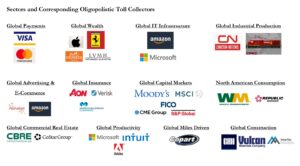Last week’s tariff and geopolitical news and the stock market’s reaction may have felt unsettling, and we wanted to take a moment to check in with you and share our perspective. Volatility like this can be unnerving, but we find reassurance in a simple truth: over time, the stock market has weathered wars, depressions, pandemics, banking crises, tariff disputes, and more—yet it has continued to thrive. As difficult as this moment may feel, our country has endured far worse and come out stronger. The reason? Humanity’s relentless capacity for innovation has consistently overcome even the most daunting challenges.
Our investment strategy reflects this resilience. By focusing on dominant, oligopolistic businesses—toll-takers on GDP with conservative balance sheets—we believe we’re well-positioned to navigate tough periods and capitalize on recoveries. Trash will still be collected, products will still be shipped across railroads, payments will still be processed, roads will still be repaired, and toothpaste and insurance will still be bought. Interestingly, these volatile times often benefit the strongest companies. While weaker competitors struggle, the leaders can seize market share, acquire undervalued assets, or even repurchase their own stock at bargain prices. It’s a dynamic that doesn’t always feel positive in the moment but often proves advantageous in hindsight.

That said, with such a rapid sell-off, it’s natural to feel uncertain right now. But for perspective, consider this: the market is at levels it traded only eleven months ago, and near levels it approached just eight months ago. So, does this mean we have much farther to go or that we should “buy the dip?”
The full impact of recent developments, though they could get severe, remains unclear. First-order effects, such as reduced global trade, higher prices, and softer demand, are straightforward enough to estimate. But the ripple effects—tariff retaliation, potential de-escalation (which could take time to heal), foreign boycotts of American goods, substitution trends, shocks to real incomes, recessionary or deflationary pressures, reduced business confidence, and uncertainty over final policy outcomes—are far harder to predict. Add in potential Fed interventions, political efforts to temper tariff policies, and looming budget or tax reforms, and the picture grows even more complex.
On the brighter side, we remain optimistic about the future. AI and technological advancements promise significant productivity gains, and human ingenuity has a proven track record of pushing through adversity. Still, you might wonder if reducing stock exposure makes sense? It’s a fair question, but even that isn’t clear-cut— inflationary periods, for instance, can erode fixed-income returns. Ultimately, we take comfort in owning productive assets: cash-flow-generating businesses with pricing power, capable of maintaining margins across a range of economic scenarios.
History backs this up. Stocks have delivered double-digit returns over the long term, even when factoring in wars, recessions, boom/bust cycles, and pandemics. Yes, stock prices can disconnect from underlying business value during turbulent times, but that’s where opportunity lies. We’re actively trimming positions that have held up well and reallocating to high-quality names we’ve long wanted to own at more attractive prices. As respected value investor Shelby Davis once said, “You make your money during a bear market—you just don’t realize it at the time.”
This isn’t uncharted territory. To provide additional context, here is a link a letter we wrote in 2022 about bear markets. We believe its insights remain relevant and hope it offers clarity amid today’s uncertainty.
If you have questions or just want to talk things through, please don’t hesitate to reach out. We’re here for you.
Sincerely,
The YCG Team


